Mayor Bowser promises action to fix the park field
Mayor Muriel Bowser attended last night’s meeting of the LeDroit Park Civic Association to announced her priorities and take questions from the audience. During the question period, the Association’s parks committee chair discussed the shabby state of the field at the Park at LeDroit. Ms. Bowser directed her two Ward One staff liaisons to add this to their “hotlists”.
The company that constructed the fields at the four-year-old park layered sod on top of construction fill that they piled over old asphalt pavement. The result has been a patchy field with areas of dead grass and protruding construction material. During the fall tree planting with Casey Trees, volunteers broke several pieces of Casey Trees’ equipment trying to dig holes into which the 45 trees were planted.
In May of last year, I led a neighborhood walk-through with then-Councilmember elect Brianne Nadeau and we stopped by the field to inspect its poor condition. Don’t give up hope! The Civic Association is building a campaign to get the field repaired for good.
Video from the mayor’s presser on recent flooding
The mayor’s news conference on the establishment of an anti-flooding task force drew a lot of media attention. All the local affiliates covered it:
- NBC 4 (WRC) – video below
- FOX 5 (WTTG) – video below
- ABC 7 (WJLA) – video below
- Channel 9 (WUSA)
Watch the videos below.
Read the rest of this entry »
Marc Morgan’s ANC campaign kicks off tomorrow at Shaw’s Tavern
 Marc Morgan, currently the President of the LeDroit Park Civic Association, is running for the ANC seat that covers most of LeDroit Park. Mr. Morgan’s campaign kicks off tomorrow, Wednesday, August 22, from 6 pm to 9 pm at Shaw’s Tavern (6th Street and Florida Avenue NW). Everyone is welcome to attend.
Marc Morgan, currently the President of the LeDroit Park Civic Association, is running for the ANC seat that covers most of LeDroit Park. Mr. Morgan’s campaign kicks off tomorrow, Wednesday, August 22, from 6 pm to 9 pm at Shaw’s Tavern (6th Street and Florida Avenue NW). Everyone is welcome to attend.
Local notables in attendance include our current commissioner, Myla Moss, who has chosen not to seek reelection, and Patrick Mara, who is the Ward 1 member of the State Board of Education. Come on out, meet your neighbors, and meet the candidate.
The event is open to the public.
Marc Morgan running for LeDroit Park’s ANC seat
 Marc Morgan, President of the LeDroit Park Civic Association, is running unopposed for ANC 1B01, the seat that covers most of LeDroit Park. Myla Moss, our current ANC commissioner, has decided to retire from the seat she has held since January 2005.
Marc Morgan, President of the LeDroit Park Civic Association, is running unopposed for ANC 1B01, the seat that covers most of LeDroit Park. Myla Moss, our current ANC commissioner, has decided to retire from the seat she has held since January 2005.
Since I serve as Mr. Morgan’s campaign chair, I will share with you reasons you should vote for him in November.
For the past two years, Marc Morgan has served as President of the LeDroit Park Civic Association and has worked to bring the residents of the neighborhood together by hosting a mix of social activities and informational programs. Additionally, Mr. Morgan has been a strong advocate for the neighborhood by lobbying District agencies, including the DC Housing Authority, DC Water, and the District Department of Transportation, to better respond to problems facing residents in LeDroit Park.
For example, Mr. Morgan coordinated meetings between the residents of the Kelly Miller apartments and the DC Housing Authority to address crime, building deterioration, and youth engagement.
Last fall Mr. Morgan also coordinated the first annual LeDroit Park Oktoberfest, a neighborhood celebration that highlighted LeDroit Park’s diversity and offered activities for residents of all ages. Additionally, he has created a monthly neighborhood happy hour that provides neighbors an opportunity to meet and talk in a relaxed setting.
More recently, Mr. Morgan has work with the Metropolitan Police Department to address crime in LeDroit Park. Mr. Morgan continually pushes for increased police presence and responsiveness. Mr. Morgan also advocates measures to prevent crime and has consulted local residents and businesses to identify and report suspicious activity.
Within the next few weeks, he plans to roll out a new initiative that calls for increased police presence, identification of criminal hotspots, and crime prevention education in both LeDroit Park and Bloomingdale. The overall objective is to reassure residents that LeDroit Park and Bloomingdale are safe, thriving neighborhoods.
Outside of community activism, Mr. Morgan is the Director of Development for the American Council On Renewable Energy (ACORE), a non-profit dedicated to promoting the use of renewable energy.
Morgan has been a resident of Ward 1 for over 12 years and has spent the last 4 years in LeDroit Park. For more information, you can visit his website or Facebook page.
Mayor Gray announces a task force to address area flooding
Later this morning, Mayor Vincent Gray, Councilmember Kenyan McDuffie (D – Ward 5), and representatives from DC Water and District agencies, will announce the creation of a task force to address the flooding that has occurred in numerous basements in LeDroit Park and Bloomingdale since July.
The mayor and councilmember will hold the press conference today at 11:30 am at the park at triangle park at First Street and Florida Avenue NW.
During several downpours in July, the overtaxed sewers below Florida Avenue in LeDroit Park and below several streets in Bloomingdale backed up into residents’ basements.
DC Water, the semi-independent agency that manages the drinking water and sewer infrastructure, says the completion of new diversion sewer tunnels in 2025 will solve the problem for good. Waiting 13 years is little consolation for residents whose basements have flooded with diluted sewage.
City grants license for All Souls, slams opponents
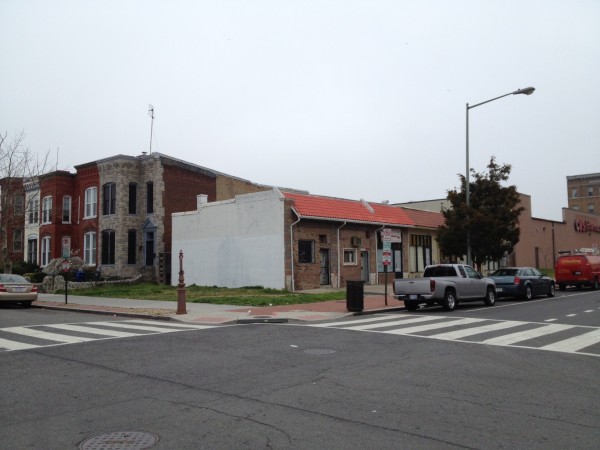
The Alcoholic Beverage Control (ABC) Board will grant a license for All Souls, the proposed restaurant to occupy the long-vacant storefront at 725 T Street. All Souls became a lightning rod for unexpected opposition in March, drawing crowds and TV news coverage to its liquor license hearing. The objections covered the usual grounds: too much noise late into the night, too many drivers looking for parking, too many chances for general disorder.
The proprietor had long before agreed to only serve alcohol inside and only serve after 5 pm.
The most unusual objection, however, was that it is harmful for children to look across the street and view adults consuming alcohol. The objection seemed like a quaint, Puritanical reaction incongruent with a diverse, secular city.
DC law does, however, recognize that alcohol-serving establishments near schools merit at least some level of extra scrutiny. In fact the law prohibits the issuance of liquor licenses
within 400 feet of a public, private, or parochial primary, elementary, or high school; college or university; or recreation area operated by the District of Columbia Department of Parks and Recreation (DC Code §25-314(b)(1)).
The protestors, legally referred to as “protestants”, thought this provision would damn the All Souls application. The same section of the DC Code, however, lists 10 exceptions to the 400-foot rule, including this important one:
The 400-foot restriction shall not apply if there exists within 400 feet a currently-functioning establishment holding a license of the same class at the time that the new application is submitted. (DC Code §25-314(b)(3))
The board found that the Mesobe market in the orange building at 1853 7th Street NW is indeed already within 400 feet of the school. The distance measurement, the board’s ruling stated, “‘shall be the shortest distance between the property lines of the places.’ 23 DCMR §101.1 (West Supp. 2012).”
The existence of Mesobe within 400 feet of the school provides a precedent that satisfies the exception for All Souls, the board decided.
With that argument down, the board addressed the general assertion that it is unsafe for children to view adults consuming alcohol. Here is where the board delivered its most scathing criticism of the objectors:
Finally, we reject the Protestants’ unsubstantiated assertion that the mere sight of the Applicant’s tavern will be detrimental to the students of Cleveland Elementary School… Indeed, if we accepted the Protestants’ argument that the mere sight of adults in a tavern consuming alcohol is harmful to children, the Board would similarly have to ban children from:
- entering restaurants that serve alcohol to patrons;
- attending sporting events where alcohol may be consumed by adult fans;
- eating dinner with their parents if wine is served with the parents’ meal;
- participating in religious ceremonies where wine is part of the service; and
- walking through neighborhoods with large concentrations of liquor-serving establishments during the daytime, such as Adams Morgan and U Street.
The board further described the objection as “unworkable, unreasonable, and not in accordance with current societal practices.”
There are a few important lessons from this case. The most important is that District boards don’t always cave to the flimsily argued demands of a vocal few. A common complaint, especially among the business community, is that DC’s various boards, such as Zoning Commission, the Board of Zoning Adjustment, the Historic Preservation Review Board (HPRB), the Old Georgetown Board, the ABC Board, etc., exercise their discretion in ways that are too often inconsistent or outright bizarre.
The most frustrating experience with these boards is encountering unsupported opinions. In cases before the HPRB, many opponents argue that a proposed building is “incompatible” with the historic district while they fail to elaborate why it is allegedly incompatible. Georgetown resident Topher Matthews explained this sentiment that I have also encountered when following historic preservation cases:
Time and time again, neighbors use the historic preservation design review process to object to the size of the project rarely out of any genuine concern for the preservation of the neighborhood’s historic character but rather because they simply just don’t like the project. The basis for the complaints would be no different than if the project were in a brand new development with no historic character: it blocks my view, it’s too big, you’ll be able to see into my garden, et cetera.
In the All Souls case, the school proximity argument failed to establish harm to students to a degree that would warrant killing off a local business. It is a non sequitur to many people that children are harmed by catching a glimpse of adults across the street sipping wine at 5 pm. Merely believing that something is true doesn’t necessarily make it true. In rejecting this claim, the ABC Board made the right decision.
The entire licensing process, which was unusually protracted in this case, certainly cost the proprietor of All Souls a hefty sum in legal fees. When the proprietor attended community meetings on his proposed license, he usually had his attorney with him to address the fine legal distinctions, especially as it applied to the somewhat complicated 400-foot rule.
In fact I pitied the man. All he wanted to do was open up his small businesses. His modest license request unleashed the histrionic vitriol of a few strident Furies who spoke as though he were defiling the sanctity of childhood itself!
The board ratified a voluntary agreement between All Souls and three neighbors uninvolved in the school-proximity protest. The text of this side agreement is not currently available, but if it is like most other voluntary agreements, it likely negotiated closing hours and restrictions on indoor music volume, not moral arguments about child psychology and societal vice.
The good news is that even the school-proximity opponents who lost their case actually won. Cleveland Elementary School is a great school and will continue to be a great school long after All Souls has poured its inaugural beer. The conversion of the vacant storefront into an occupied business will deter the loitering and drug dealing along that block of T Street and will remove a visible physical blight from the neighborhood.
The neighborhood and the school will both be better off once All Souls opens.
Meet Mayor Gray in LeDroit Park on Friday
Mayor Vincent Gray is visiting LeDroit Park on Friday night at 7pm. The LeDroit Park Civic Association has moved its June meeting to Friday, June 15 at 7 pm to accomodate the mayor’s visit. The mayor will address various questions from neighbors and about the neighborhood. The civic association has forwarded on to the mayor several questions regarding the park and regarding crime in the neighborhood.
Please join us for this special civic association meeting in the basement of the Florida Avenue Baptist Church. We are hoping the mayor will join us afterward for a brief neighborhood tour if his schedule permits it.
All residents are encouraged to attend.
The Lincoln vs. the Howard: What a difference operations make
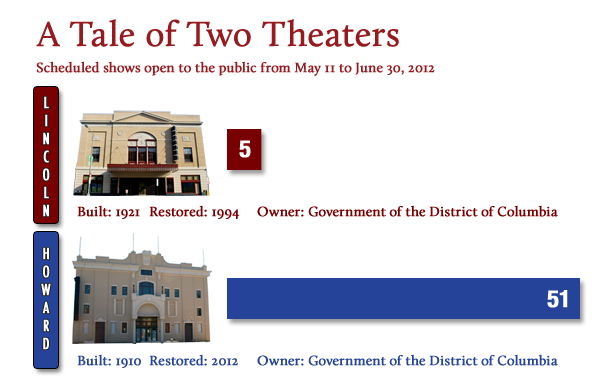
The revival of the Howard Theatre brought worry that our newly revived venue would follow the disappointing path of the Lincoln Theatre on U Street. After all, both theaters were built in the early 20th century, both are owned by the DC government, and both are located within a short walk of each other.
A glance at both theaters’ online schedules reveals that their fates have sharply diverged. From now until the end of June, the Lincoln Theatre has 5 events scheduled while the Howard has 51.
This glaring disparity shows the importance of selecting the right management team. The District chose the experienced Blue Note Entertainment Group to run the Howard while it chose the non-profit U Street Theatre Foundation to run the Lincoln. The mayor’s office rightly revoked U Street Theatre Foundation’s contract for the Lincoln as the theatre was careening toward bankruptcy at the end of 2011. The mayor has tasked the DC Commission on the Arts and Humanities with finding a new operator for the Lincoln.
The greater U Street area is a regional arts venue. The Howard Theatre, the 9:30 Club, U Street Music Hall, the Black Cat, Bohemian Caverns, Twins Jazz Club, and numerous performance-oriented bars provide an amount of live performance space most cities would envy. But when we compare the success of these venues to the fiasco of the Lincoln Theatre, it becomes clear that something is terribly wrong in the District’s stewardship of this resource. If all of these venues can thrive, so can the Lincoln.
A moratorium will stifle new restaurants and lower service
We recently received a petition to oppose a liquor license moratorium for the U Street area. We weren’t sure why the petition came up, but it seems there is yet another movement afoot to establish a liquor license moratorium (and thus a restaurant moratorium) on U Street. The moratorium’s backer is a resident on 13th Street and she proposes the moratorium for all new liquor license applications within a 1,800-foot radius of Ben’s Next Door.
We wrote about this matter two years ago when Jim Graham floated the idea. Nonetheless, it’s worth revisiting why this moratorium is a bad idea:
It makes no distinction between responsible businesses and rowdy businesses.
A moratorium fails to differentiate between businesses that are quiet and cause no trouble for their neighbors, e.g. the Saloon, and those that cause raucous noise late into the night. ANCs and neighbors should protest irresponsible and disruptive businesses, but a moratorium is essentially a permanent, unconditional protest of all proposed restaurants and bars. Many new establishments are started by experienced restaurateurs whose previous businesses exist in harmony with their neighbors.
It’s effectively a restaurant moratorium.
Restaurants make their money on alcohol and relatively little on food. This is why Shaw’s Tavern, when dry, quickly shuttered. Prohibiting the issuance of new liquor licenses will essentially deny new restaurants the ability to earn enough to pay rent. A liquor license moratorium is a restaurant moratorium.
It will reduce customer service.
A moratorium will limit the supply of restaurants and bars even while demand rises. This means restaurant prices will face upward pressure, seating may become scarcer, and service quality will likely fall. The population of the census tract covering the eastern side of the U Street corridor grew by 86% from 2000 to 2010 and will continue to grow as more residential buildings come online. If you think finding a table is hard now, a moratorium will make it worse.
It unfairly “picks winners”.
Placing a legislative cap on new business activity unfairly privileges incumbent businesses. To intervene so severely in the market as to artificially limit consumer choice means that current license holders will enjoy an oligopoly. This increased business, however, will not result from a restaurant’s merit, but will result from the fact that consumers will face limited choices. A business owner’s “merit” will simply be that he had the good luck open shop just before the regulatory door slammed shut behind him.
It’s arbitrary.
There are currently 107 licenses within the proposed moratorium area. There is no definitive proof that the 107 number is too high, too low, or just right. Unfortunately, moratoria disregard nuance and set arbitrary numbers as permanent limits.
Furthermore, it’s arbitrary to propose that the moratorium be based on a perfect circle, that the circle have a 1,800-foot radius, and that the circle be centered on Ben’s Next Door.
It will not resolve the stated problem.
Matters of crime, noise, and trash, which the City Paper reports as the main motivators for the moratorium’s proponent, will not be resolved by a moratorium. Restricting the issuance of alcohol licenses will not reduce crime, will not reduce noise, and will not reduce trash. It will, however, result in longer wait times for table, higher prices, and lower service.
It’s difficult to administer.
Laws should be simple to understand and administer. The proposed moratorium area is a circle and circles are harder to measure on land. In fact, we discovered this problem recently when measuring the distance between a liquor store and Cleveland Elementary School. Do you measure by the edge of the property line or by the edge or the building? Certainly we have the technology today to determine this distance, but it takes time and skill to do it accurately. The technical challenge is a hurdle for business owners and citizens alike to understand the impact of the law. A listing of city blocks would be far easier to decipher and would cause less confusion than a circle.
* * *
Instead of swinging a legal sledgehammer to stop all future restaurants, good and bad, we should judge each application on its own merit. Restaurateurs who have proven records of being good neighbors should by all means receive licenses and less reputable restaurateurs should be denied. We urge you to sign the petition to oppose the moratorium.
All Souls in the news
Channel 7 ran a short story on the fracas over the All Souls tavern license we reported earlier.
Unfortunately we weren’t able to make the Alcoholic Beverage Control (ABC) Board hearing on Wednesday, but we heard secondhand that it was quite a show.
A commenter from a previous post pointed us to an article sympathetic to the opposition.
The article notes that the ABC Board does not typically grant alcohol licenses within 400 feet of a school unless there is already another alcohol license within 400 feet of the school. In this case, All Souls would qualify since Boston Wine & Spirits (1905 9th Street) is within 400 feet of the school.
We looked up on Google Earth the distance between Boston Wine & Spirits and Cleveland Elementary School and marked a 400-foot yellow line in the map below. We were able to spot-check the relative accuracy of the program by measuring the right-of-way distances in Google Earth and comparing them to the numbers in the Baist Real Estate Atlas of the area. By a more generous measure, where we measure from the school building instead of the school’s property lot (outlined in red) to 9th Street in front of and thus beyond Boston Wine & Spirits, it appears that Boston Wine & Spirits is within the 400 feet.
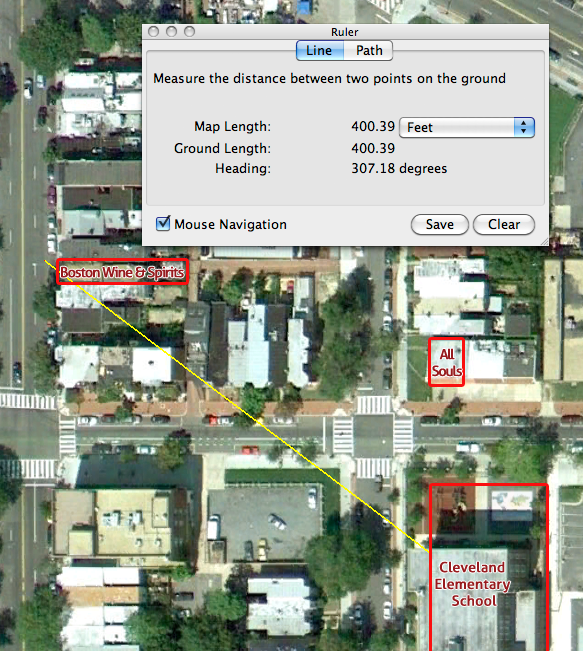
Here is another interesting tidbit from the article:
The parent group who is behind the protest of the bar conducted a survey. According to the survey, 45% of Cleveland Elementary School teachers would be reluctant to attend evening activities at the school and 33% of parents would remove their children from the school should the bar open up across the street…
It seems the frequent, blatant, and public drug-dealing and urination a block away have not deterred these hardy souls from attending Cleveland, but the thought of a 5 pm happy hour across the street will.

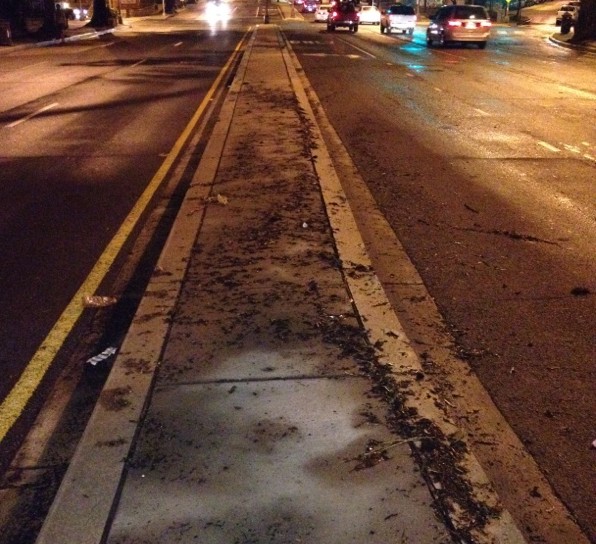
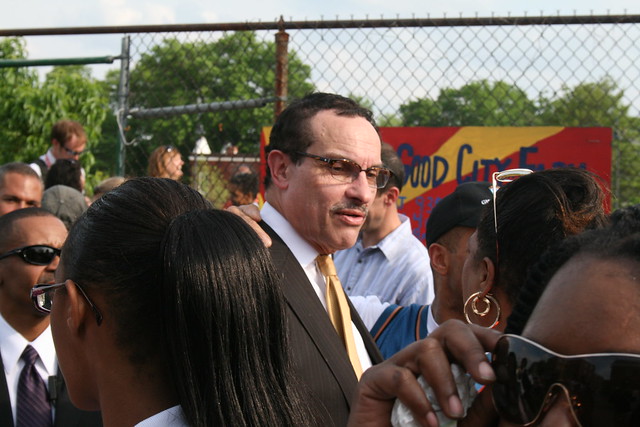






Recent Comments